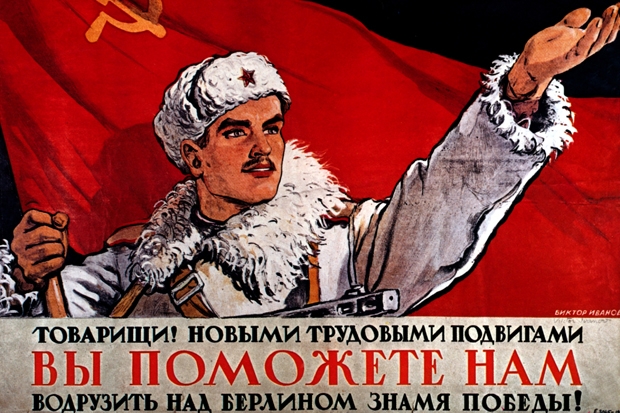‘Gilded doorknobs,’ spits a Party diehard as she contemplates the blessings of the Soviet Union’s collapse. ‘Is this freedom?’ Dozens of witnesses from the ‘lost generation’ in Russia who had ‘a communist upbringing and a capitalist life’ share Elena S’s disgust and bewilderment as they contribute to this epic fresco of an empire’s bitter aftermath. Some adjust smartly to the post-Soviet disorder, although a 35-year-old advertising manager reflects that ‘I never dreamed of being fucked in stairwells or saunas in exchange for expensive dinners.’ The few winners and many losers agree: ‘You can’t buy democracy with oil and gas… You need free people, and we didn’t have them.’
Since the millennium, the Swedish Academy has rewarded two great reporters with the Nobel Prize for Literature. Both show how empires end in minds as well as on maps. In his travelogues, V.S. Naipaul has chronicled not only the British imperial twilight but the longer rhythms of Islamic ascendancy and fragmentation. Svetlana Alexievich, born to a mother from Ukraine and a father from Belarus, has turned her own Naipaul-like marginality into a vantage point that lends a panoramic view of a culture in ruins.
Last year, she took the Nobel for five interview-led works that trace the downfall and afterlife of sovok — Soviet man —and build into a single ‘history of utopia’. True, Naipaul puts his own journey centre-stage while Alexievich retreats into the wings to let her subjects speak. But this is the art that conceals art. Her editor’s flair for selection, contrast and emphasis, her almost cinematic touch with cuts, pans and close-ups, make her a documentary virtuoso and not a transcription machine.
Prefaced by a jostling collage of voices from kitchen and street, each half of Second-hand Time traces the experience of ten individuals and their families in the years after the USSR crumbled in 1991. Act I covers the gangster melodrama of the 1990s, when a gang of kleptocratic oligarchs plundered the empire’s corpse and ‘the black marketeers and money-changers took power’. Memories of vanished Soviet glory drive most testimonies, even when the system starved or crushed its people: ‘Yes, we stood in line for rotting chicken and discoloured potatoes, but it was our Motherland. I loved it.’ Now, the salami — almost a running gag here — has improved, but the soul has shrivelled. ‘There’s loads of salami in the shops, but no happy people.’
In Act II, echoes of wartime victory and Soviet solidarity fade to expose the hopeless wasteland of the 2000s. Something, or someone, must satisfy Russia’s gnawing hunger for lost order and grandeur. A new name surfaces more than halfway through this 700-page doorstop of decline: ‘ “Putin the democrat” is our shortest joke.’ As nostalgia and nihilism combust, the residue looks strangely familiar. ‘Everyone needs a Tsar,’ says a high-ranking former Kremlin apparatchik. Many voices in this vast polyphony agree. ‘Our lives reel between barracks and bedlam,’ Elena S laments. Gorbachev opened the doors to bedlam. Now the barracks look tempting again. More upbeat, a beer-drinker insists that ‘Empire and communism are ingrained in us. We seek out heroic ideals.’
That heroism — or militarism — has delivered grief on an inconceivable scale. From the Gulag to Stalingrad, from early Bolshevik (and Tsarist) atrocities to post-imperial massacres in Georgia or Azerbaijan, blood soaks the pages. Frequently, people wage war on themselves. Suicide runs like a red thread through these accounts, from the Soviet Marshal Akhromeyev, who shot himself in 1991, to the young waitress Tamara, who tells Alexievich that she ‘has never seen anything good or beautiful in this life’. After their sessions, she takes her leave of it.
Even love may bring death. We meet an Armenian Juliet, who lost her Azeri Romeo to yet another vicious post-Soviet conflict of the 1990s. She had read Shakespeare’s play — almost every witness here, however humble, devours good literature — and thought: ‘It’s about my life.’ Alexievich seldom adds stage-directions to her interviews. For this one, she does: ‘Both of us cry.’
This long journey through public and private bereavement can feel like a hard slog. Take it rather in brief, galvanising shots, as fierce as the grog that succours so many invisible injuries. At the end of an execution shift in Stalin’s camps, we learn, ‘They would bring us two buckets: a bucket of vodka and a bucket of cologne.’ Alexievich listens to perpetrators and victims alike. In the wreckage of empire, they share a common destiny.
Uniforms and ideologies may change, but Russian suffering — and fortitude — endures. Both Dostoevsky and Solzhenitsyn crop up often in these confessions. Second-hand Time has snatches of impromptu tragic beauty that both might admire. ‘Who’s Red, who’s White — it makes no difference,’ says the Everywoman who bids us farewell with fond memories of a country marriage graced by lilacs and nightingales. ‘The important thing is to make it to spring.’






Comments